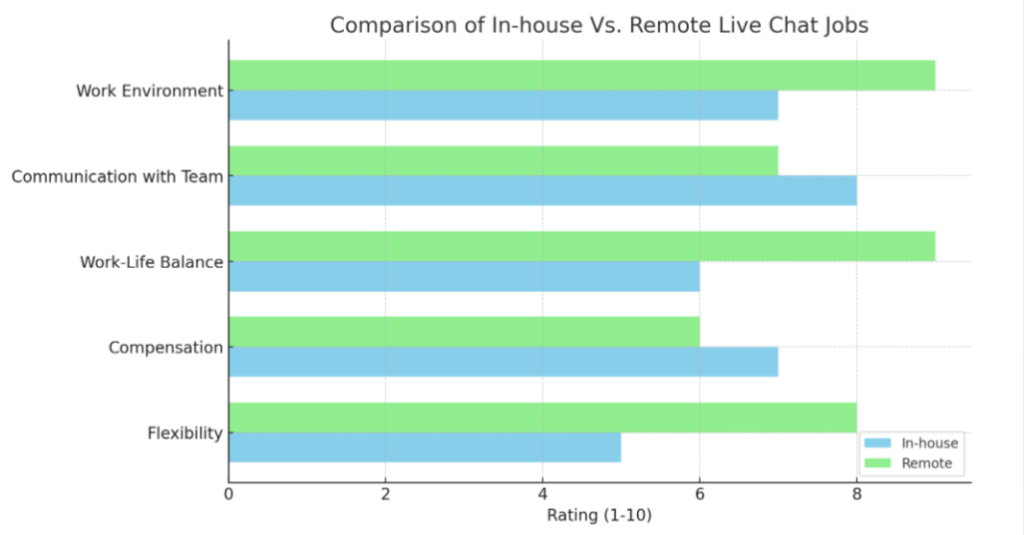In-House vs. Remote: Choosing the Right Live Chat Job Path
Are you torn between an onsite cubicle and the freedom of a home office? Recent stats reveal over 50% of people now prefer remote chat support jobs to traditional call center roles.
This post unpacks the differences, benefits, and challenges of live chat jobs whether they’re in-house or from your cozy living room. Dive in to find which suits you best!
Key Takeaways
- Remote work allows employees to perform live chat jobs from various locations beyond a central office, while work from home specifically refers to working from one’s residence.
- Compensation for remote live chat positions can be competitive and may offer savings due to reduced costs of living, but it’s important for companies to provide fair payment reflecting the workers’ skills and the cost of living in their area.
- Maintaining connections with coworkers when working remotely is vital; digital tools like video conferencing help foster teamwork and combat feelings of isolation.
- Work-life balance should be prioritized in both remote and in-house roles through setting boundaries, creating routines, and ensuring time for self-care.
- Deciding between an in-house or remote live chat job involves considering your personal preferences on workplace structure, compensation, social interaction level, flexibility, and your ability to manage a healthy work-life dynamic.
Understanding Remote Work vs. Work From Home
Remote work and work from home are two popular options for call center agents and customer service professionals. Remote work refers to a situation where employees do not have to commute or physically go into an office, whereas work from home specifically means working from one’s residence.
Definition of remote work
Remote work allows employees to perform their jobs from locations outside a central office or corporate setting. This could be from home, a co-working space, or even while travelling—as long as there’s an internet connection.
It’s a flexible employment option where communication and tasks are carried out using digital tools and platforms.
This form of employment is not tied to any specific geographical location, giving workers the freedom to design their own schedules around personal commitments and preferences. It relies heavily on technology for collaboration and completion of projects, leveraging email, chat support, video calls, online communication platforms and various virtual work resources.
Telecommuting has become increasingly prevalent in industries such as customer service where live chat jobs can easily be managed remotely.
Types of remote workers (fully remote, freelancer)
Now that we’ve outlined the concept of remote work, let’s dive into the types of remote workers you might encounter in the workforce. Generally, these fall into categories like fully remote employees and freelancers, each with their unique style of integrating work into their lives.
- Fully Remote Employees: These workers are employed by a company but perform all their duties from a location outside the traditional office. They often have fixed hours and receive benefits similar to in-house staff. Fully remote employees rely on digital tools for communication and collaboration, connecting with teammates across distances.
- Freelancers: Individuals who operate independently, offering their services to multiple clients, are known as freelancers. They set their schedules and choose which projects to take on. Freelancers embrace teleworking as they manage various virtual support roles or specialize in areas such as web design or content creation.
Definition of work from home
Work from home means employees perform their job duties from the comfort of their own living spaces instead of going into a traditional office setting. This employment arrangement allows for greater flexibility as individuals can structure their workday around personal responsibilities and preferences.
People who work from home typically use digital tools like email, video conferencing, and online chat platforms to communicate with colleagues and complete tasks. It’s a popular option for those in customer service roles, such as live chat jobs or virtual support positions.
With home-based work, the boundary between professional and personal life blurs as your living space doubles as your workspace. Employees often need strong self-discipline and time management skills to stay productive while working remotely.
The setup reduces commute times to zero, saves on transportation costs, and gives workers more control over their environment. While it offers a level of convenience unmatched by in-house arrangements, managing distractions at home is crucial for success in these types of jobs.
Key differences between remote work and work from home
Remote work and work from home may seem similar, but they have distinct differences. Remote work typically refers to a situation where an employee works away from the traditional office.
However, work from home specifically means working from one’s residence instead of commuting to an office or other location. While remote workers can be employed by a company and may work in various locations such as coffee shops or coworking spaces, individuals who work from home are based at their personal residences.
One major difference between remote work and work from home is the level of flexibility in terms of physical location. Remote workers have the liberty to choose where they want to conduct their tasks, while those working from home are limited to their residential space for completing job responsibilities.
Pros and Cons of Remote Work and Work From Home
Remote work offers flexibility and the opportunity to work from anywhere, but it can also lead to feelings of isolation; on the other hand, working from home allows for a better work-life balance and eliminates commuting, but it may also come with distractions.
Interested in learning more? Keep reading!
Compensation
Remote work offers competitive compensation packages, including hourly wages or salary with potential bonuses and benefits. Employees may also have the opportunity to negotiate flexible payment options that suit their lifestyle.
pensation structure, but remote work often allows for lower costs of living in various locations, potentially resulting in higher overall earning potential.
Compensation is a crucial aspect of employment and remote workers are increasingly seeking fair pay that reflects their skills and contributions. In contrast, traditional office-based jobs likely involve set salaries without much regard for geographical differences in cost of living.
Connection to coworkers
Connecting with coworkers is vital for remote workers. Virtual communication platforms and video conferencing facilitate real-time interaction and collaboration, allowing remote employees to stay engaged with their team members.
Building strong relationships through digital channels fosters a sense of community and teamwork, despite physical separation. Engaging in regular virtual meetings and group discussions enables remote workers to maintain a connection with colleagues, promoting effective collaboration on live chat jobs.
Maintaining an active connection with coworkers fosters a positive work environment where ideas can be shared freely. Digital tools like instant messaging and collaborative platforms enable seamless communication between team members regardless of their location.
Work-life balance
Transitioning from the importance of connection to coworkers, maintaining a healthy work-life balance is crucial for remote and in-house professionals alike. Setting clear boundaries between work and personal life helps prevent burnout and maintain overall well-being.
Remote workers often enjoy greater flexibility in managing their schedules to accommodate personal commitments while in-house employees benefit from clear separation between their professional and personal lives.
Balancing work responsibilities with personal time requires intentional efforts such as setting specific working hours, taking regular breaks, and creating a designated workspace. Whether working remotely or in an office environment, prioritizing self-care alongside professional obligations contributes to sustained productivity and fulfillment.
Work location
Remote work provides the advantage of choosing where to work, whether it’s from a home office, co-working space, or even while traveling. Employees can tailor their work environment to suit their preferences and needs, fostering productivity and satisfaction.
On the other hand, in-house positions require employees to commute to a specific location; however, this offers direct access to colleagues for collaboration and support.
In remote roles, individuals have the flexibility to set up their workspace according to personal comfort and focus preferences. This gives them autonomy over their surroundings and allows them to create an environment that enhances their productivity.
Challenges and Benefits of Both Options
Remote work brings challenges like potential feelings of isolation, while also offering benefits such as flexibility and the ability to work from anywhere. On the other hand, working from home may present challenges in maintaining work-life balance but provides the convenience of being in a familiar environment.
Challenges of remote work
Challenges of remote work include:
- Adjusting to a lack of face-to-face interactions with colleagues, impacting camaraderie and team collaboration.
- Balancing work and personal life when the boundaries between home and office blur, leading to longer working hours.
- Managing potential distractions at home such as family demands, household chores, or noisy environments.
- Maintaining strong communication with supervisors and team members without the benefit of in – person cues.
- Coping with feelings of isolation due to limited social interactions and a sense of disconnection from the company culture.
Challenges of working from home
Working from home comes with its own unique set of challenges that can impact productivity and well-being. Some key challenges include:
- Managing Work-Life Boundaries: Juggling work and personal life in the same space may blur boundaries, making it challenging to separate the two.
- Social Isolation: Limited interaction with colleagues can lead to feelings of isolation and a lack of camaraderie.
- Distractions: Home environment may present distractions such as household chores, family members, or pets, impacting focus and concentration.
- Lack of Structure: Without a structured office environment, maintaining a routine can be difficult, affecting time management and discipline.
- Technology Issues: Dependence on reliable internet connectivity and technical equipment could pose hurdles for seamless remote work execution.
- Ergonomic Concerns: Inadequate workspace setup at home can lead to discomfort or health issues over extended periods.
Advantages of remote work
- Remote work offers flexibility, allowing individuals to create their own work environment and schedule.
- Employees can access a broader range of job opportunities regardless of their geographical location.
- It provides a better work – life balance as employees save time on commuting and have more time for personal activities.
- Remote work encourages increased productivity due to fewer distractions and interruptions.
- It enhances employee autonomy and empowerment by offering a greater sense of control over their work environment and schedule.
- Remote work fosters diversity by creating opportunities for individuals who may have physical limitations or caregiving responsibilities.
- Employees often experience reduced stress and improved mental well – being when working in a comfortable environment that suits their needs.
Advantages of working from home
Working from home offers several advantages for chat support agents, such as:
- Flexibility to create a comfortable workspace that suits individual needs and preferences.
- Freedom from commuting, reducing stress, saving time, and cutting costs on transportation.
- Opportunity to balance work and personal commitments effectively.

Conclusion
In weighing the options for live chat jobs, consider the benefits and challenges of in-house versus remote opportunities. Evaluate factors such as work-life balance, connection to coworkers, and compensation.
Whether working from an office or remotely, weigh all aspects before making a decision. Assess your priorities and preferences before choosing the best fit for you.

